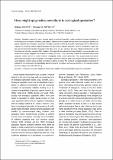Files in this item
How might epigenetics contribute to ecological speciation?
Item metadata
| dc.contributor.author | Smith, Gilbert | |
| dc.contributor.author | Ritchie, Michael G. | |
| dc.date.accessioned | 2014-07-22T09:31:01Z | |
| dc.date.available | 2014-07-22T09:31:01Z | |
| dc.date.issued | 2013 | |
| dc.identifier | 74601289 | |
| dc.identifier | d3502866-1564-4f2e-b4f4-0e25a4aab98b | |
| dc.identifier | 000324341700012 | |
| dc.identifier | 84889245328 | |
| dc.identifier.citation | Smith , G & Ritchie , M G 2013 , ' How might epigenetics contribute to ecological speciation? ' , Current Zoology , vol. 59 , no. 5 , pp. 686-696 . | en |
| dc.identifier.issn | 1674-5507 | |
| dc.identifier.other | ORCID: /0000-0001-7913-8675/work/46761134 | |
| dc.identifier.uri | https://hdl.handle.net/10023/5055 | |
| dc.description.abstract | Speciation research has seen a renewed interest in ecological speciation, which emphasises divergent ecological selection leading to the evolution of reproductive isolation. Selection from divergent ecologies means that phenotypic plasticity can play an important role in ecological speciation. Phenotypic plasticity involves the induction of phenotypes over the lifetime of an organism and emerging evidence suggests that epigenetic marks such as cytosine and protein (histone) modifications might regulate such environmental induction. Epigenetic marks play a wide role in a variety of processes including development, sex differentiation and allocation, sexual conflict, regulation of transposable elements and phenotypic plasticity. Here we describe recent studies that investigate epigenetic mechanisms in a variety of contexts. There is mounting evidence for environmentally induced epigenetic variation and for the stable inheritance of epigenetic marks between generations. Thus, epigenetically-based phenotypic plasticity may play a role in adaptation and ecological speciation. However, there is less evidence for the inheritance of induced epigenetic variation across multiple generations in animals. Currently few studies of ecological speciation incorporate the potential for the involvement of epigenetically-based induction of phenotypes, and we argue that this is an important omission | |
| dc.format.extent | 11 | |
| dc.format.extent | 99983 | |
| dc.language.iso | eng | |
| dc.relation.ispartof | Current Zoology | en |
| dc.subject | Ecological speciation | en |
| dc.subject | Adaptation | en |
| dc.subject | Reproductive isolation | en |
| dc.subject | Phenotypic plasticity | en |
| dc.subject | Epigenetic mechanisms | en |
| dc.subject | Cryptic genetic-variation | en |
| dc.subject | DNA methylation | en |
| dc.subject | Arabidopsis-thaliana | en |
| dc.subject | Transgenerational inheritance | en |
| dc.subject | Soft inheritance | en |
| dc.subject | Evolution | en |
| dc.subject | Divergence | en |
| dc.subject | Selection | en |
| dc.subject | QL Zoology | en |
| dc.subject.lcc | QL | en |
| dc.title | How might epigenetics contribute to ecological speciation? | en |
| dc.type | Journal article | en |
| dc.contributor.sponsor | NERC | en |
| dc.contributor.institution | University of St Andrews. School of Biology | en |
| dc.contributor.institution | University of St Andrews. Centre for Biological Diversity | en |
| dc.description.status | Peer reviewed | en |
| dc.identifier.url | http://www.currentzoology.org/paperdetail.asp?id=12282 | en |
| dc.identifier.grantnumber | NE/E008216/1 | en |
This item appears in the following Collection(s)
Items in the St Andrews Research Repository are protected by copyright, with all rights reserved, unless otherwise indicated.

